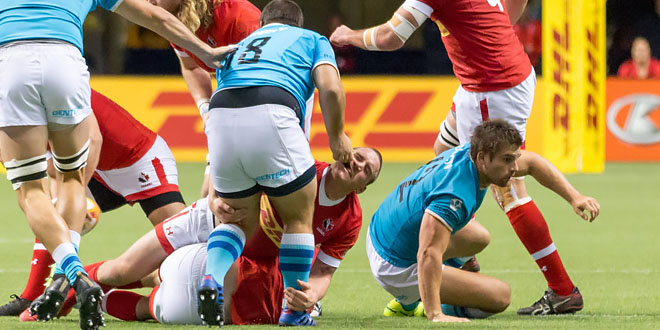World Rugby has been forced to backtrack on their Rugby World Cup Qualifying process just a day after confirming the path to France 2023. Originally set to be determined in the Americas Rugby Championship, the Americas path is now in disarray with North and South America on course to split the larger region’s allocated qualifier spots.
The World Cup has traditionally grouped the Americas together as a whole, most recently designating two spots as Americas 1 and Americas 2 with a third Americas representative competing in the global Repechage tourney for the final ticket. Sudamérica Rugby are now demanding that one spot be guaranteed for a South American team. It’s not an entirely new request but after Uruguay’s success in Japan now has real weight behind it.
With Argentina qualifying for RWC 2023 automatically via their third-place finish in Pool C at RWC 2019, it would pave the way for Uruguay and the likes of Chile and Brazil to contest the South American spot. The USA and Canada would then be at the top of the hierarchy in the Rugby Americas North region.
If a regional tourney is the preferred route of qualification, such a change would require either an expanded Repechage tournament or an Americas play-off between the North and South runners-up. Based on current rankings it could see Canada facing off against Brazil with only the winner moving on to the last-chance qualifier.
Suddenly in question is the status of the senior Americas Rugby Championship. In the four years since being elevated to full test status in 2016 the tournament has become a highlight on the annual fixtures list in the Americas with the top six teams across North and South America competing. Argentina enter their second-senior side but remain a perennial title contender.
There is now consideration being given to reduce its status to a development tournament. Sudamérica Rugby President Sebastián Piñeyrua suggests in an interview with El Observador’s Ignacio Chans that the senior ARC might even be scrapped altogether.
“Among the South American leaders we are thinking of plans according to the new reality. Build a powerful SLAR, a good international window for October and November, and look for competitions for August and September.
“It could be a Latin Cup with Georgia and Romania, Argentina and the USA, or an agreement with South Africa, some level of the Currie Cup. For us, the ARC is not the main alternative today.”
The sudden discord in the Americas stems from the recent World Rugby election that saw England’s Bill Beaumont retain his position as Chairman despite a strong challenge from Argentina’s Agustín Pichot. While South America and the USA voted for Pichot, Rugby Canada confirmed their vote for Beaumont and it was revealed that Rugby Americas North split their two votes.
A statement from Rugby Canada Chairman Tim Powers said the organization preferred the stability offered by Beaumont despite also desiring change to investment and governance.
“There were strong opinions for the merits of both candidates within our group. There was general agreement that there is a need for change within World Rugby in terms of investment… and a need to update World Rugby’s governance structure. The current global situation with COVID-19 also highlighted the need for stability during this challenging and uncertain time.
“We believe Mr. Beaumont will bring a commitment to progress in our areas of concern, while also offering the stability required to see the world game through this challenging time.”
Many were confused by Rugby Canada’s position, with Piñeyrua openly expressing his disappointment to Powers on social media.
Key is understand who works in the last 5 years to bring opportunities to Americas and pay with gratitud . Really very disappointing. Proud of @sudamericarugby and all our Unions for the support given to our leader @AP9_ . Thanks to all the Rugby community for their huge support
— Sebastian Piñeyrua (@pinopuca) May 2, 2020
Further explanation of Rugby Canada’s decision came during a discussion between Powers and Dr. Pat Parfrey, Canada’s representative on the World Rugby Council. In the video presented by Newfoundland Rugby, Dr. Parfrey confirmed that Canada’s long-held ties with England were a primary factor.
“Their manifestos were similar. I thought that Beaumont was a very reliable, avuncular, reasonable guy who followed through on what he said. On a character level, I thought you couldn’t criticize Beaumont, and on his manifesto you couldn’t criticize him.
“On the past history of England’s support of Canada for 40 years, their funding of the Churchill Cup affected the debt of 3-4 million dollars. The fact that they certainly come to Canada at regular intervals. You need to have a very good reason to not support the candidate from England.
“In the COVID-19 era, where we’re going to come out of this weak, we’ll need support to get back on our feet. I would think that the most likely country in the world to support Canada would be England.”
While the RFU’s support for Canada over many years is certainly not in question, it should be noted that the Churchill Cup was last contested in 2011. England have not played Canada since, though they are now scheduled to tour North America while the Lions head to South Africa in 2021.
Dr. Parfrey did not spare the World Rugby Council of criticism. He explained his frustration with the state of governance, particularly the inability of those not on the Executive Committee to influence decisions.
“World Rugby is a bureaucracy that makes a large amount of money from the World Cup and distributes that money over the ensuing 3-4 years. It tries to ensure that teams are more competitive at the World Cup and supports the Tier 2 countries, but the reality is that the foundation countries get the bulk of the money because they’re also fragile.
“There is that tension between what money you put into the Tier 2 countries that have to improve. If rugby is to become any kind of an attractive sport you’re going to need more than 12 countries competing.
“They had very strong people who come up with the plans to deal with the various countries, but it’s driven by the amount of money that can be used. The governance structure is that of an executive committee that has the power to advise the CEO on decisions, just like Rugby Canada, and then you’ve got a Council that has no influence that meets twice a year for two hours and presses buttons and puts their hands up.
“The issues that arise in rugby – like these issues between Pichot representing the Southern Hemisphere and Beaumont representing the Northern Hemisphere – they have never been discussed at Council, and they should be. There should have been a way to resolve the issue of a global game and the various other issues that came into effect between the Southern Hemisphere and the Northern Hemisphere.
“I haven’t the slightest interest in being window dressing. I want to do something. It’s just been a waste of time. I think that they need to get a role for Council that involves them in strategic decisions for the world game.”
Voting reform was a key feature of Pichot’s platform, but not that of Beaumont. On that basis the explanations given will do little to quell criticism that Canada has sided with ‘the old guard’, or maintained their ‘commitment to the commonwealth’ instead of supporting an Americas candidate.
It is precisely this fact that has drawn the ire of Piñeyrua and his companions in the South. For the Uruguayan it is unacceptable that votes of Rugby Canada and Rugby Americas North should go against what had been envisioned as a united Americas region.
“Nobody is angry about the election, the problem is that Americas United lost its meaning. But it wasn’t us. We have to worry about our own pathway. We don’t want to be surprised and alone overnight. Today we have no guarantees. The concept of union between the Americas has been greatly weakened since North America did not support Pichot and divided 2 votes for each side. If they did not support their own candidate, what is the point?”
Sudamérica Rugby may be accused of petulance or posturing but it is difficult to ignore what is a legitimate grievance. Piñeyrua now considers North America – or at least Canada – to be closer aligned to Europe than South America.
The breakdown in trust has created a rift in the Americas that will not be easily solved. At best the path to the World Cup looks certain to be altered. At worst the ARC may be dissolved, a competition that has been enormously beneficial to the game on both continents. To lose such an event to board room drama would be a backwards step for all parties.
 Americas Rugby News Rugby news from across the Americas!
Americas Rugby News Rugby news from across the Americas!




